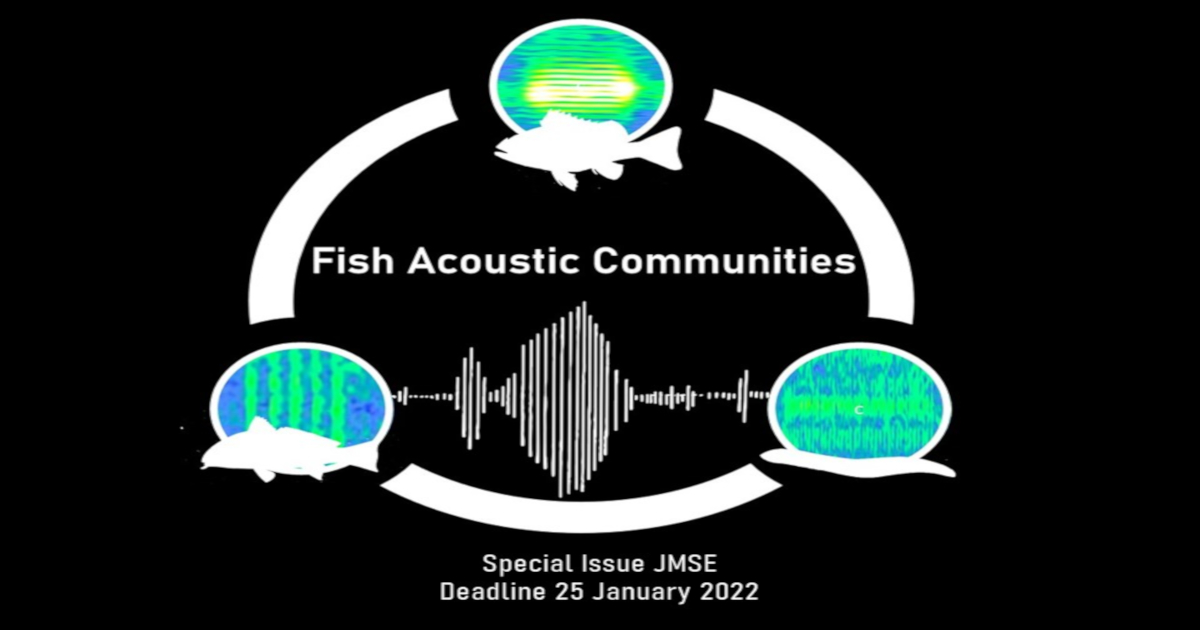Fish Acoustic Communities in a Conservation Perspective
A special issue of Journal of Marine Science and Engineering (ISSN 2077-1312). This special issue belongs to the section "Marine Biology".
Deadline for manuscript submissions: closed (25 January 2022) | Viewed by 4809

Image courtesy of Dr. Marta Bolgan and Dr. Lucia di Iorio
Special Issue Editors
Interests: acoustic communication; fish bioacoustics; passive acoustic monitoring; fish acoustic community ecology
Special Issue Information
Dear Colleagues,
This Special Issue aims to present a collection of studies in the emerging field of fish acoustic community ecology. Fish sounds are major contributors to marine and freshwater soundscapes. In recent decades, we have learned how sounds emitted by fish can be used as proxies for informing our understanding about the diversity of species, the phenology of biological events, the location of functional sites (e.g., spawning grounds) and the status of fish populations.
The study of fish sounds at the community level, including fish acoustic community composition, organization and variability, represents today an emerging new field, which holds the promise of providing fine-scale spatiotemporal information on patterns and changes from the species up to the community level.
The purpose of this Special Issue is to foster discussions on the potential applications of fish acoustic community ecology for obtaining valuable information on fish biodiversity dynamics and changes.
Papers may be focused on the following areas:
- Fish acoustic signal description and classification methods;
- Fish acoustic community analysis methods;
- Contribution of acoustic monitoring to traditional fish community monitoring techniques;
- Experimental studies investigating the acoustic adaptive hypothesis and/or the acoustic niche hypothesis in acoustic fish communities;
- Characterization of acoustic fish communities and comparison over different spatial and temporal scales;
- Influence of the environment on the composition and organization of fish acoustic communities.
Dr. Marta Bolgan
Dr. Lucia di Iorio
Guest Editors
Manuscript Submission Information
Manuscripts should be submitted online at www.mdpi.com by registering and logging in to this website. Once you are registered, click here to go to the submission form. Manuscripts can be submitted until the deadline. All submissions that pass pre-check are peer-reviewed. Accepted papers will be published continuously in the journal (as soon as accepted) and will be listed together on the special issue website. Research articles, review articles as well as short communications are invited. For planned papers, a title and short abstract (about 100 words) can be sent to the Editorial Office for announcement on this website.
Submitted manuscripts should not have been published previously, nor be under consideration for publication elsewhere (except conference proceedings papers). All manuscripts are thoroughly refereed through a single-blind peer-review process. A guide for authors and other relevant information for submission of manuscripts is available on the Instructions for Authors page. Journal of Marine Science and Engineering is an international peer-reviewed open access monthly journal published by MDPI.
Please visit the Instructions for Authors page before submitting a manuscript. The Article Processing Charge (APC) for publication in this open access journal is 2600 CHF (Swiss Francs). Submitted papers should be well formatted and use good English. Authors may use MDPI's English editing service prior to publication or during author revisions.
Keywords
- acoustic niches
- acoustic adaptations
- fish acoustic ecology
- acoustic ecology
- acoustic communities
- bioacoustics
- conservation biology
- fish sounds
- passive acoustic monitoring
Benefits of Publishing in a Special Issue
- Ease of navigation: Grouping papers by topic helps scholars navigate broad scope journals more efficiently.
- Greater discoverability: Special Issues support the reach and impact of scientific research. Articles in Special Issues are more discoverable and cited more frequently.
- Expansion of research network: Special Issues facilitate connections among authors, fostering scientific collaborations.
- External promotion: Articles in Special Issues are often promoted through the journal's social media, increasing their visibility.
- e-Book format: Special Issues with more than 10 articles can be published as dedicated e-books, ensuring wide and rapid dissemination.
Further information on MDPI's Special Issue polices can be found here.






